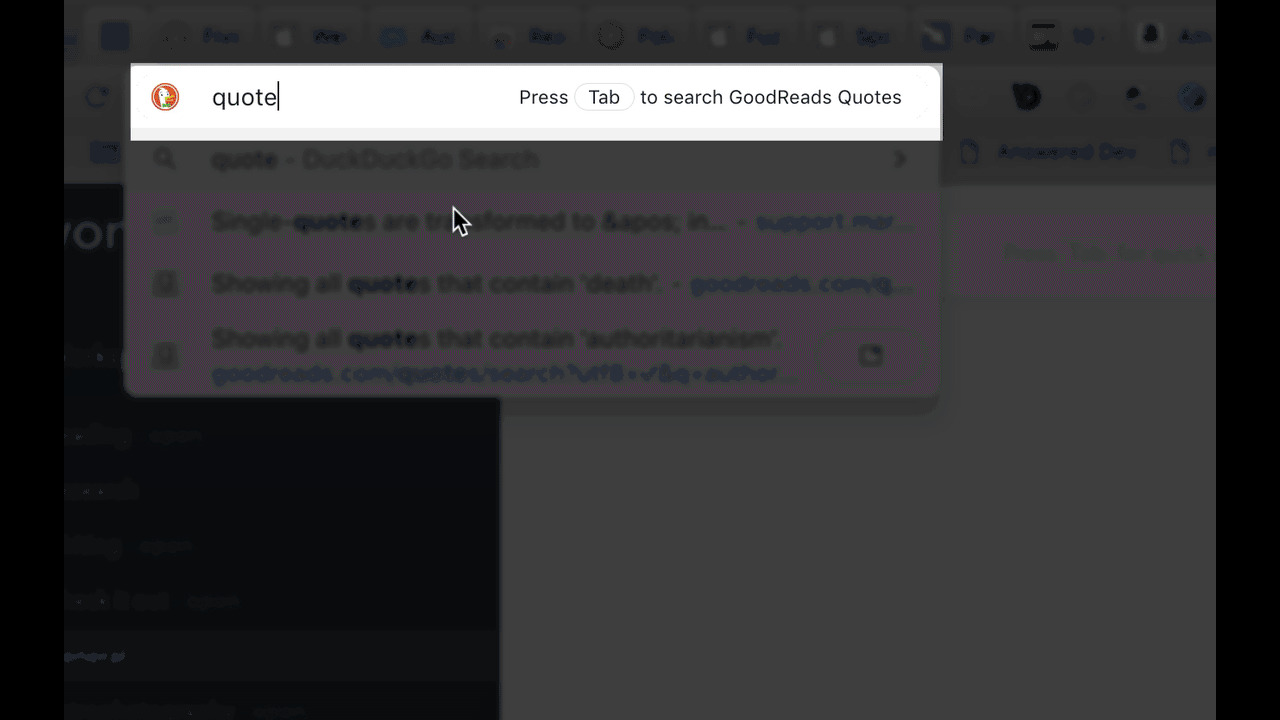Save time with Chrome custom search engines
While Firefox has made very impressive strides, I still use Chrome as my primary browser. It’s due in no small part to the Workona extension, but that’s beside the point of this post. I wanted to talk about one of my favorite little productivity tips for Chrome that doesn’t require any extensions or hacks.
Custom search engines allow you to type an abbreviation, hit tab, then type a query to jump straight to the search results on just about any site that has a search tool (so just about any site).
Here’s a step-by-step for adding a time-saving search. As an example, I’ll show how to add a search for instantly finding the best literary quotes about a topic using the GoodReads quote search.
Setting up a custom search
-
Start by going to the site you’d like to get the results from and running a search (any search). Copy the URL that’s generated after the results are shown. Save that. It will look like:
https://www.goodreads.com/quotes/search?utf8=%E2%9C%93&q=your+search&commit=Search -
Open Chrome preferences (use ⌘-comma like an adult). Scroll down to the Search Engine section and click on Manage Search Engines.
- You’ll notice that Chrome has already saved a lot of searches you’ve run in the past. You can click the dots on the right side of any of these to edit the keyword to something short and access your previously-used searches conveniently.
-
To add your own custom search, click the Add button next to the Other search engines header.
-
Fill in the details…
- Give your search a title (this will show up in the toolbar as “Search in [title]”). In this case I used “GoodReads Quotes.”
- Choose the keyword that you’ll type to initiate the search. I used “quote.”
- Now paste in the search url you copied in step 1, and change the portion of it that contains the search you ran originally to
%s. That will be replaced with the text you enter in the URL bar at the time you call the custom search engine. In this case:
https://www.goodreads.com/quotes/search?utf8=%E2%9C%93&q=%s&commit=Search
Now when you jump to the URL bar (again, use Cmd-L instead of clicking like an animal), you can just type “quote
“A reliable way to make people believe in falsehoods is frequent repetition, because familiarity is not easily distinguished from truth. Authoritarian institutions and marketers have always known this fact.”
— Daniel Kahneman, Thinking, Fast and Slow

Some of my favorite custom searches
-
I use the Adobe Stock Photos site quite a bit, so I created a custom search for
stock [query]to run those quickly.https://stock.adobe.com/search?k=%s -
As I mentiond, I freqently use
bt [query]to search my site using a DuckDuckGo site-specific search (in this case with a bunch of extra query settings).https://duckduckgo.com/?q=%s&sites=brettterpstra.com&sort=date&ko=1&k3=ttscoff&k1=-1&k4=-1&ke=-1&kj=%23153041&kp=-1&ks=m&kx=%23703C43&ky=y&kr=-1&kq=n&kh=1&kf=-1&ki=-1&ka=n&ki=-1&k7=%23FFFFFF&k9=%234599C6&kaa=%23367394&kab=%239F0F27&k8=%238E8D8D -
Epoch converter (
epoch 1548783431)https://www.epochconverter.com/?source=searchbar&q=%s -
Search the online Marked documentation (
mh):http://marked2app.com/help/search/?q=%s -
And the Marked support forums (
ms):http://support.markedapp.com/search?q=%s&t=d&recommend=1 -
Search MacStories
http://www.macstories.net/?s=%s
You get the idea, I’m sure.
Additional Notes
- In most cases you can just type a space instead of using Tab, so the simple act of typing “quote death” would automatically initiate the search.
- If you didn’t mean to start a custom search, for example if you meant to send the word you typed to the default search engine, just hit backspace and it will restore the word and cancel the custom search.
- You can also use custom search engines to create site-specific searches for DuckDuckGo or Google: for example, if I want to search my own posts using DuckDuckGo, I type “bt”, hit Tab, and then any keywords I need. This executes a site-specific search sorted by date with the URL
https://duckduckgo.com/?q=%s&sites=brettterpstra.com&sort=date.
Got your own gems for Chrome, or want to talk about how you accomplish this on other browsers? Your comments are, as always, welcome below.
